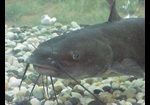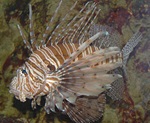 Catfish:
Catfish:
Catfish are freshwater fish that are named for their catlike whiskers. Although people commonly think that these whiskers sting, catfish wound a person by puncturing or piercing the skin with spines that are located on their fins. Both the top and side fins have spines. If irritated, the catfish may then release and inject venom.

Lionfish:
Lionfish are colorful fish that can inflict a very painful wound. When they puncture, their spines (at the tip of the narrow top fins) usually release venom that can cause swelling and blistering. Because they are attractive, some people keep lionfish in saltwater aquariums. In the ocean, they live mostly in deep water reefs and caves.
Stingray:

The southern stingray is commonly found along the Atlantic coast from the Chesapeake Bay to the Gulf of Mexico. It can move from saltwater to freshwater and may be found in the ocean or in river inlets close to the ocean. Like other stingrays, it has a wide, flat body and long tail with one or more barbed stingers. These barbs can release venom when stinging their victim. To avoid stepping on a stingray, shuffle your feet as you walk in the water.
Common Symptoms of Punctures:
Uncommon Symptoms of Punctures:
What to Do if Someone is Punctured:
Stingrays usually require medical attention:
• If any small pieces of spine or barb remain in the wound, pull them out with tweezers or scrape them off with a credit card or dull knife. Do not remove them with your fingers, or you may be punctured again.
• If you cannot easily remove pieces of spine or barb, seek medical help.
• Submerge the injured part in hot water at as high a temperature as the patient can tolerate without injury for 30-90 minutes. This will inactivate the venom and provide some pain relief.
• Over the counter medicines such as Tylenol® or Ibuprofen may help with pain relief if the hot water soak was not done or if it was delayed.
• Use an anesthetic cream (lidocaine) as directed for moderate itching, burning, pain, or inflammation.
• Follow up with your primary care provider if you need a tetanus booster.
• Stingray punctures usually require medical attention.
• Call 911 if you are having trouble breathing or have chest pain.
Call NC Poison Control at 1-800-222-1222 or chat from this site for questions or for further treatment advice.